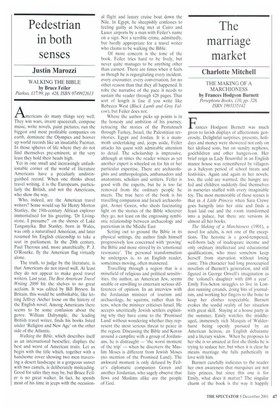Pedestrian in both senses
Justin Marozzi
WALKING THE BIBLE by Bruce Feller
Piatkus, £17.99, pp. 428, ISBN 0749922613
Anericans do many things yen,' well. They win wars, invent spacecraft, compose music, write novels, paint pictures, run the biggest and most profitable companies on earth, dominate the Olympics and hoover up world records like an insatiable Pacman. In those spheres of life where they do not find themselves pre-eminent, at the very least they hold their heads high.
Yet in one small and increasingly unfashionable corner of the world of literature Americans have a peculiarly undistinguished record. When one thinks about travel writing, it is the Europeans, particularly the British, and not the Americans, who show the way.
Who, indeed, are the American travel writers? Some would say Sir Henry Morton Stanley, the 19th-century African explorer immortalised for his greeting, 'Dr Livingstone. I presume?' on the shores of Lake Tanganyika. But Stanley, born in Wales, was only a naturalised American, and later resumed his English citizenship to take a seat in parliament. In the 20th century, Paul Theroux and, more anarchically, P. J. O'Rourke, fly the American flag virtually alone.
The truth, to judge by the literature, is that Americans do not travel well. At least they do not appear to make good travel writers. Last year, The Best American Travel Writing 2000 hit the shelves to no great acclaim. It was edited by Bill Bryson. In Britain, this would be unthinkable, like letting Jeffrey Archer loose on the history of the English novel. Among Americans there seems to be some confusion about the genre. William Dalrymple, the leading British travel writer, finds his books listed under 'Religion and New Age' on the other side of the Atlantic.
Walking the Bible, which describes itself as an international bestseller, displays the best and worst of American traits. Let us begin with the title which, together with a handsome cover showing two men traversing a desert landscape in a gorgeous sunset with two camels, is deliberately misleading. Good for sales they may be, but Bruce Feiler is no great walker. In fact, he spends most of his time in jeeps with the occasion
al flight and luxury cruise boat down the Nile. In Egypt, he sheepishly confesses to feeling guilty at being met at Cairo and Luxor airports by a man with Feiler's name on a sign. Not a terrible crime, admittedly, but hardly appropriate for a travel writer who claims to be walking the Bible.
Of more concern is the tone of the book. Feiler tries hard to be lively, but never quite manages to be anything other than earnest. There are times when it feels as though he is regurgitating every incident, every encounter, every conversation, for no other reason than that they all happened. It robs the narrative of the pace it needs to sustain the reader through 428 pages. That sort of length is fine if you write like Rebecca West (Black Lamb and Grey Falcon), but Feiler does not.
Where the author picks up points is in the honesty and ambition of his journey, retracing the stories of the Pentateuch through Turkey, Israel, the Palestinian territories, Egypt and Jordan. It is a mammoth undertaking and, jeeps aside, Feiler attacks his quest with admirable attention to detail. The scholarship is impressive, although at times the reader winces as yet another expert is wheeled OD for his or her particular expertise. There are archaeologists and anthropologists, ambassadors and anatomists, scholars and settlers. Feiler is good with the experts, but he is too far removed from the ordinary people he meets. The true hero of the book is his travelling companion and Israeli archaeologist, Avner Goren, who sheds fascinating light on the stories of the Bible wherever they go, not least on the engrossing symbiotic relationship between archaeology and patriotism in the Middle East
Setting out to ground the Bible in its physical settings, the author finds himself progressively less concerned with 'proving' the Bible and more stirred by its 'emotional resonance'. The personal transformation he undergoes is, to an English reader, sometimes moving, often mannered.
Travelling through a region that is a minefield of religious and political sensitivities, the author, an American Jew, seems unable or unwilling to entertain serious differences of opinion. In an interview with the Jordanian minister of tourism and archaeology, he squirms, rather than listens, when the minister criticises Israel. He accepts uncritically Jewish settlers explaining why they have come to the 'Promised Land' without wondering whether they represent the most serious threat to peace in the region. Discussing the Bible and Koran around a campfire with a group of Jordanians, he is distraught — 'the worst moment of the trip' — when he discovers the Muslim Moses is different from Jewish Moses (no mention of the Promised Land). The awkward moment is only defused by Feilet' s diplomatic companion Goren and another Jordanian, who sagely observe that Jews and Muslims alike are the people of God.






















































































 Previous page
Previous page